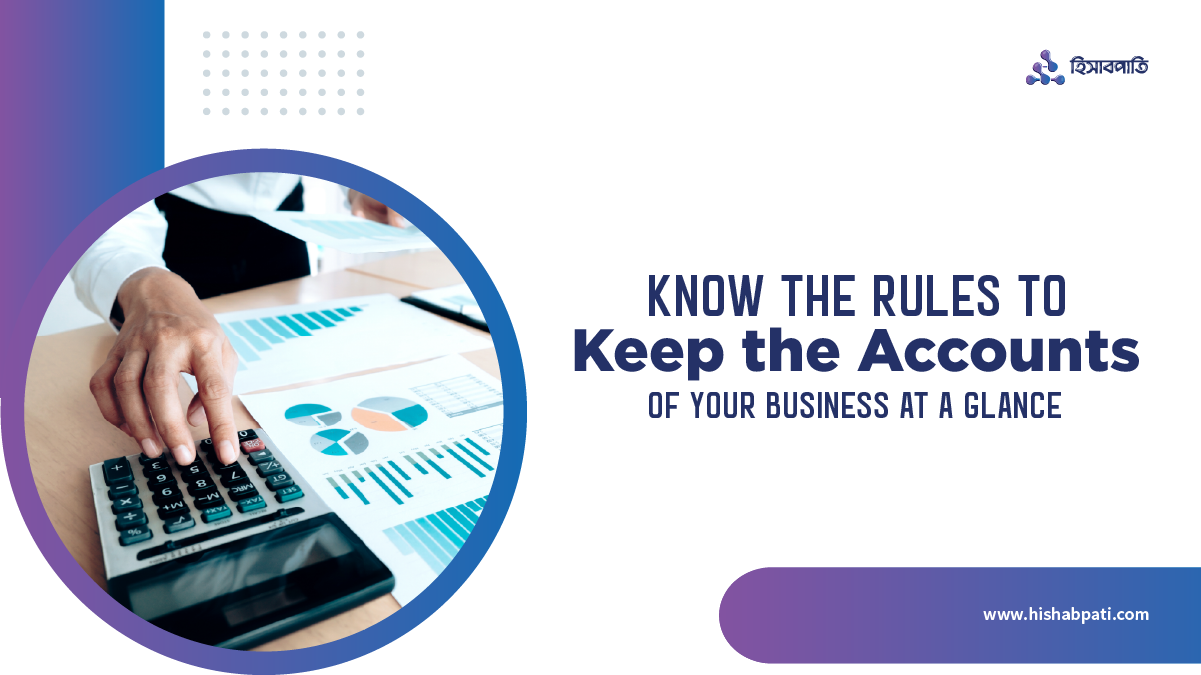Whether your business is small or large, it’s your dream. You need to take care of the business correctly to make that dream come true. Again, to take exact care of your business, you need to keep track of the daily transactions correctly. If you can’t keep track of these accounts properly, your business can never become successful. So, to run your business successfully, read this article and know the rules to keep accounts of your business at a glance. If you follow the below-mentioned rules in the right manner, you can keep accounts of your business properly.
- Have Different Bank Accounts for Your Personal Use and Business Purpose
- Keep Track of the Accounts Receivable Properly
- Keep Accounts of the Business’s Cash Flows
- Keep All Receipts of Expenses at a Place
- Understand the Difference between Receipts and Invoices
- Keep Track of the Cash Expenses
- Appoint a Professional to Take Care of the Tax-Related Issues of Your Business
- Consider Sales Tax and File if Required
- File for Income Tax
- Understand the Concept of the Double Entry System of Accounting
- Keep All the Accounts of Your Business Separately
- Keep Regular Contact with Your Accountant
- Prepare the Financial Statements
- Make Budget and Future Predictions
- Use Software to Keep Accounts of Your Business
Let’s discuss these rules thoroughly.
1. Have Different Bank Accounts for Your Personal Use and Business Purpose
Many small business owners run the costs of their business using their personal funds for the initial few months. There is no harm if sometimes you use your personal fund for business purposes, but if you use your personal bank account for business use, that can be the reason for a huge problem. If you have a separate bank account for your business, it becomes quite easy both for you and your accountant to keep track of how the fund is used. When you use your personal account also for your business, many crucial business transactions can go unnoticed from your sight. Ensure that you have separated your personal and business financing in an exact manner. This means you use separate accounts and credit cards or debit cards for your personal and business purposes. Become aware enough while deciding on any expenditure and ensure whether the business-associated expenses run from the business account itself. The same thing is also applicable to personal accounts.You can depend only on the credit card or debit card for all business transactions. Because the statements of credit cards or debit cards help to keep accounts of your expenses in an easy and automated manner.
2. Keep Track of the Accounts Receivable Properly
You surely enjoy it when you get money in your hands for running the business. But keeping track of all the accounts receivable of your business is not that easy. When you issue an invoice, you write an account receivable, i.e. you write that you will get money from a customer. You can easily understand exactly how much accrual amount a customer has after seeing this list. If a customer pays you money, you will write that on their invoices, and you will mark that as paid. But when you have innumerable orders, it can be easier said than done. You sometimes, keep the customers’ deposited amounts to be reconciled later because you don’t get sufficient time during the day. It means during the time of tax audit, you have lots of customer deposit amounts in your revenue account, and all your accounts receivable amounts don’t match. As a result, here, you have to waste a lot of time updating all lists, you can also pay excess tax, and your debt amount will enhance. So, you need to keep track of each transaction of your business exactly when it takes place. Keep track of the paid amounts of your customers on a monthly basis. It will save you a lot of time and money.
3. Keep Accounts of the Business’s Cash Flows
You need to have some accounting knowledge to keep accounts of your small business properly. For example, you can prepare cash flow statements to keep accounts on a weekly or monthly basis. These statements will give you a complete idea about the cash inflow and cash outflow of your business. A cash flow statement mainly observes the direction of income. It also contains time elements that help you see payment cycles and seasonal expenses. You can get the knowledge of anticipating expenses and well-distribution of income from the cash flow statement. Besides, these help in business planning or making budgets. If you follow the right procedure, you will get an overall idea of how cash is working in your business. Again, if you apply an automatic accounting system, you can easily see different metrics and data regarding cash movement.
4. Keep All Receipts of Expenses at a Place
Keep all receipts of expenses carefully in place to keep all your accounts properly. Many business people are reluctant about doing this task, and so, they face different accounting, cash flow, and tax-related issues. Have you ever noticed that you have been charged BDT 100 in your bank statement and you don’t know why it has been done? If such a thing has happened, you might not be keeping your business accounts that well.
You can solve this problem by keeping all the receipts of the things you buy for your business with care. The task can seem quite difficult after listening to it, but you can do it quite easily by following some techniques. For instance, pay all your business expenses using a credit card or debit card. Again, use a certain place to keep all the receipts such as your desk or drawer. It will be better if you click the pictures of those receipts instantly on your mobile. These techniques will help to keep you organized so that you can file taxes on time.
Some examples of your business expenses are given below that you mostly avoid while keeping accounts.
- Business travel expenses: When you go outside of the city for business travel, record the amount of money you spend on an air ticket as an expense. If you have passed most of the time on the road, you can write down the miles you have travelled by car and the cost of gas or petrol.
- Office expenses: Write down if you have spent on the computer or any other office equipment for tax calculation.
- Home office costs: Sometimes, you work from home. Then write down the costs you bear to work for the office also as expenses.
- Vehicle-related expenses: If you use any vehicle for official tasks, note down the rent of that vehicle as expenses.
- Meals, refreshments, and entertainment: If you spend on meals, refreshments, or drinks while meeting with a client, note down those in your expense report.
- Gifts: This is a bit related to meals, refreshments, and entertainment. For instance, if you go to an event or dinner with a business prospect, it will fall under meals, refreshments, and entertainment. But if that client goes on an event or dinner themselves i.e. they bear the expenses themselves, it will be a gift.
Expense reports play a great role during tax calculations. So, make your employees understand its importance and tell them to keep all the expense receipts with care whenever they go outside for any business task, so that no mismatch occurs in expense accounts during tax audits.
5. Understand the Difference between Receipts and Invoices
If you run a business and don’t understand the difference between receipts and invoices, you will face innumerable difficulties while keeping accounts of your business. So, it’s important to understand the difference between these two. A receipt is a piece of paper that states that a transaction has taken place. This means you give your client a receipt when a transaction is completed. Conversely, an invoice is one such piece of paper that states that you have served your customer and it lists all the services you have offered your customer. An invoice holds significance because it helps to enhance the speed of cash flows, keep financial accounts, and ensure you regarding your receivables. Invoices remind customers that they need to pay you. If you can’t differentiate between receipts and invoices, you won’t be able to say clearly what has taken place and what’s going on. And you will face so many difficulties to make balance in your business accounts.
6. Keep Track of the Cash Expenses
Keep track of all the cash expenses of your business well so that you can easily subtract the total expenses from the total income of your business to determine the overall profit for that year. Doing this is not that tough. You will write down whenever a cash expense takes place or ask for a receipt from your service provider so that you won’t fall into any kind of trouble during tax calculations.
7. Appoint a Professional to Take Care of the Tax-Related Issues of Your Business
Many businessmen don’t appoint any professional accountant to take care of the tax-related issues of their business to save some money and try to handle the matter themselves. As a result, they lose many opportunities for tax exemption, again, in many cases, they can pay less tax, which becomes a reason for paying penalties. Thus, they are losing so much money just to save a little money. A professional accountant knows well about all modern, timely, and ever-changing tax trends and laws, and can give much advice to make the financial position of your business strong. If there is any chance of a tax increase in the future, they can also give you helpful advice to handle that situation.
8. Consider Sales Tax and File if Required
Be ready to collect sales tax for your business. Whether you will have to consider sales tax depends on the law and jurisdiction of the country in which you are doing business. In the case of certain products, you won’t require paying sales tax based on the country and jurisdiction. You don’t need to pay sales tax, you will collect sales tax from your customers and mention that on the cash receipts. You will pay this collected tax to the Government. And, if you can’t collect tax from your customers, you will have to pay this tax yourself when the tax auditor visits your store or shop.
9. File for Income Tax
Income tax is the tax that you pay to the government at a certain rate based on your income. Like other taxes, this one also has different rules and requirements. Consult with your appointed accountant to understand everything well who will make you understand how you will file for income tax. Generally, based on your business type such as sole proprietorship, partnership, LLC or Limited Liability Company, or any other type, your type of tax filing will be different.
10. Understand the Concept of the Double Entry System of Accounting
You must understand the double entry system of accounting. Here, the main concept is that if you buy anything for your business, you need to keep two records, not one. It means that if you have bought a printer for BDT 5000 for your business, you will write negative (-) BDT 5000 on the balance sheet. But under the double entry system, you will write positive (+) BDT 5000 for inventory gain.
11. Keep All the Accounts of Your Business Separately
Keep each of your business accounts separate to keep all your business accounts properly. For this, you will need to keep so many accounts, but if you want to get a complete image of all the transactions of your business, you will need to do it.
The accounts that are most important for keeping separately:
- Sales (your revenue)
- Purchase (supplies)
- Accounts receivables (the money you will get from your customers)
- Accounts payables (the money you will need to pay others)
- Payroll expenses
- Retained earnings (your profit)
- Owner’s equity (the money that you and others invested in the business)
If you want to focus more deeply on each detail such as each transaction or product purchase, you can divide the accounts into more subdivisions.
12. Keep Regular Contact with Your Accountant
Keep regular contact with your accountant because they often use many jargons in their reports that you might not understand. Because you are a small business owner, not an accounting or tax expert. These appointed professionals can give you many crucial suggestions to make the financial condition of your business solid.
13. Prepare the Financial Statements
Prepare different financial statements for your business such as balance sheets, income statements, and cash flow statements. A balance sheet shows the situation of assets, liabilities, and equity of your business for a certain time period. An income statement shows your business has what amount of expenses and incomes within a certain time, and it expresses the overall financial condition of the business. A cash flow statement states how the condition of cash flows of your business has changed with time. If you are a public limited company, you will need to prepare financial statements for your investors on an annual or quarterly basis. Otherwise, you can choose according to your convenience how frequently you will prepare these financial statements.
14. Make Budget and Future Predictions
You can prepare a budget and financial planning using your business’s financial statements. These financial statements have much crucial information based on which you can take different essential measures. For example, if your business has a cash flow shortage, you will collect your receivables from your customers quickly, and take different steps to increase the sales of your business.
15. Use Software to Keep Accounts of Your Business
Keeping your business accounts in the right manner is quite a complex thing. Especially, if your business is expanding, the procedure will become tougher. If a transaction takes place, it will have different entries on your different accounts in different ways. If you give these tedious procedures to some software, your task will become easier, and you can also save a lot of time.
HishabPati is a reliable software that will keep all your business accounts flawlessly and automatically. From this app, you can get your business accounts’ daily, monthly, and yearly reports. You can use HishabPati easily on your tab and computer from the browser and as an app on your mobile phone.
Final Words:
So, without any delay, read the above techniques carefully to know the rules to keep accounts of your business at a glance. And take your business to the highest level of success by applying these rules to your business.






